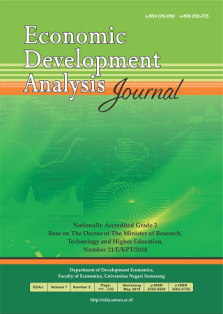Fiscal Decentralization and Regional Economic Growth
Abstract
Fiscal decentralization in Indonesia initiated in 2001 has proven to be effective and efficient; although, its implementation still need to be evaluated. The aim of the study was to analyze the implementation of fiscal decentralization on economic growth in Central Java. Tools multiple regression analysis using the method Fixed Effect Model (FEM).The period of the research was 9 years (2009-2017), and the subject of the was 35 districts/cities in Central Java Province. The dependent variable was economic growth, the independent variable was fiscal decentralization, and the control variables were investment and labor. The results showed that fiscal decentralization has a positive effect on economic growth in the district/city in Central Java. Other findings, private investment and the amount of labor encourage economic growth in Central Java. Based on findings, to reduce the fiscal gap, local governments should be able to increase their fiscal capacity through the development of commodity-based economic activity in their regions
Keywords: Fiscal decentralization, Economic growth, Investment, Labor


